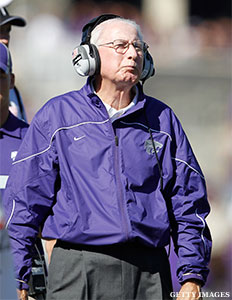
The silence said it all.
During halftime of a 39-14 win over Texas on Nov. 6, 2010, a pre-recorded message from Kansas State head football coach Bill Snyder broadcast on the Bill Snyder Family Stadium jumbotron. All Gordy Gronkowski remembers is how quiet it was.
"It went dead silent," says the father of three NFL players and one Kansas State incoming freshman. "48,000 went dead silent in that stadium when he talked. That's the respect he commands. I'll never forget that."
Gronkowski has met his fair share of football coaches, but when he visited Manhattan, Kan., during the recruitment of his youngest son, Glenn, last fall, he wasn't sure what to expect.
"Well, I expected tumbleweeds, to be honest," he says with a laugh. "But it was nothing like that. It's a nice, hard-working community."
But nothing stood out more than the grip Snyder had on that community.
"That silence told me about his character," Gronkowski says. "That was one of the selling points."
Glenn chose Kansas State in part because his brothers played for offensive coordinator Dana Dimel at Arizona, but also because it was clear that Kansas State and Manhattan were special.
How Snyder has transformed the land of losses -- Kansas State was unequivocally the worst program in the country prior to his arrival in 1988, in the midst of 26 consecutive losses -- into a destination. K-State has had 159 wins, 82 losses and a tie since 1989, including 11 nine-win seasons.
It seems like a mystery. It's not, but that has never stopped the question of just how Snyder keeps winning. The answers, you'll find, are too simple. Unsatisfactory. Where are the magic tricks?
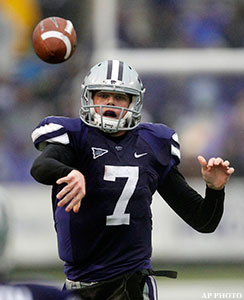
To complicate matters further, the 2011 Kansas State football season has left 10 teams wondering where Snyder stashed their legs after sawing them off for his latest, and perhaps greatest, sleight of hand.
How else do you explain a team that started an astounding 13 junior-college transfers, led by a safety and team captain who came to Kansas State as a quarterback -- and a quarterback that was a tight end who turned into a Heisman candidate -- finishing eighth in the BCS and with double-digit wins for the first time since 2003? Definitely pay attention to the 72-year-old man behind the purple curtain.
The Wildcats were picked to finish eighth in the Big 12 after a 7-6 2010 season. They opened the season with a narrow 10-7 win over Eastern Kentucky. You read that right.
"After the first two games, I told my wife, 'I think we've seen the two worst teams in the country and we're both of them,'" former Kansas State athletic director Max Urick says. And as the school's head of athletics from 1993-2001, he's seen plenty of Snyder's masterworks to know. But after those first two games (the second being a 37-0 win over Kent State), the Wildcats traveled to Miami and stopped Hurricanes quarterback Jacory Harris on 4th-and-goal with 49 seconds left in regulation for a heart-stopping 28-24 win. That's when things changed, Urick says.
"It was just amazing. Everyone was going in the same direction."
The Wildcats followed that with a 36-35 upset of Baylor and eventual Heisman winner Robert Griffin III, then reeled off another six wins, five of which were determined by seven points or less. (All told, they won eight games by seven points or less). The only losses came at the hands of Oklahoma and Oklahoma State, and Kansas State earned a berth to the Cotton Bowl. Six years after Snyder announced his retirement, and three years after he returned, the Wildcats were back where they were for more than a decade under his watch. Snyder was named Big 12 Coach of the Year, but he and Oklahoma State's Mike Gundy were edged out as the AP Coach of the Year by LSU's Les Miles.
How? The answer sounds the same no matter where you turn. Everyone that touches the program parrots the message.
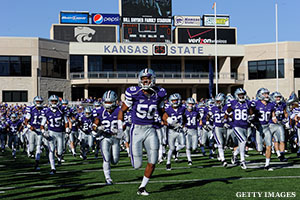
"It sounds very generic, but it really is hard work, attention to detail and in his words, being better today than yesterday," says Mark Janssen, former Manhattan Mercury sports editor and author of 'Bill Snyder: They Said It Couldn't Be Done.'
"It sounds so boring and simplistic, but he takes it to such a level, that if I didn't believe it before this year, I do now."
"He has a system that he believes in, and it's an all-in system," former Kansas State quarterback and team broadcaster of 23 years Stan Weber says, "He believes you've got to work hard every day. It's simple in its summarization, but he just wants everyone to get better every day. To focus on that day and not worry about the end result, whether it's one win or a 10-win season."
"Attention to detail and hard work ethic," safety and team captain Tysyn Hartman says. "He has that instilled in us. We have to get better every day. We always work on the little things."
"Everything matters to him," Urick says. "His attention to detail is unusual. He's very thorough. Everything matters, everything is important."
"He wants a certain kind of mentality," Gronkowksi says. "There are no prima donnas. Everyone is hard-working. Everyone works together."
It can sound like platitudes of relative importance, but there is no shrugging off the message. Everyone gets the same speeches, but everyone buys in. The story never changes from level to level. Not to get unnecessarily philosophical about it, but in a time where much is not what it seems when it comes to college football coaching and administration, the case for Snyder and his success is that everything is indeed what it seems. It's a reflection of remarkable thoroughness.
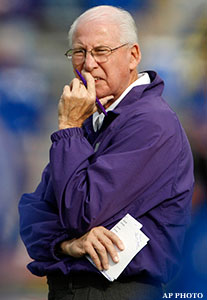
"He's very detail-oriented and doesn't leave anything to chance," Weber says. "The best analogy I can think of is that teams of electricians will have lockout/tagout procedures and double checks to make sure no one is put in a dangerous situation."
That thoroughness is so far reaching that the Kansas State staff amusingly suggested, yet with some sincere concern, that perhaps Jerry Jones was allowing scouts from his alma mater Arkansas to spy on the Wildcats from the dark corners of Cowboys Stadium during Cotton Bowl practices. It would be absolutely fair to say a few eyes were peeking over shoulders into shadowy luxury suites during those practices. Though those eyes would probably wander at any practice in a foreign environment. It's part of the system of double checks, a relentless habit of doing proven things the same way.
"In football, a lot of coaches trust that when things are going well, the momentum will just take the program forward," Weber says. "Snyder doesn't take anything for granted when things are going well. He keeps his foot on the gas. And similarly, when things are going poorly, he stays the course and doesn't change his attitude. That consistency helps."
Consistency is paramount when you're fielding a team with one of the most diverse backgrounds you'll find in college football. The Wildcats should be renamed the Misfits, or perhaps the Retrofits.
Everyone lauds Sean Payton for signing Darren Sproles, the acquisition of the year. It was Snyder who first saw Sproles' potential as a feature back when most other colleges saw him as just a returner. Jordy Nelson came to Kansas State as a defensive back, but Snyder moved him to receiver. That worked out pretty well for the Green Bay wideout. This sort of process has worked too often to be called lucky. It is arguably the greatest trick in the coach's repertoire. Few have proven themselves as master evaluators quite like Snyder, who plucks the castoffs and under-appreciated and utilizes their talents with marked efficiency.
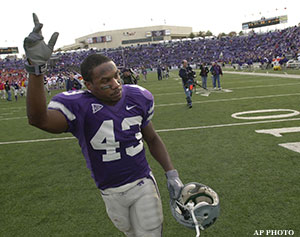
Briefly look at this year's key players, and you can see how everything comes together under Snyder's watch. Junior quarterback Collin Klein entered the program as a tight end. Klein is now fifth in the nation among quarterbacks in points per game with 19, behind Kellen Moore, Matt Barkley, Griffin III and Case Keenum. Junior linebacker Arthur Brown made 17 tackles in two years at the University of Miami, but has 95 in 12 games at Kansas State (he also had the interception that set up the game-winning field goal in the win over Baylor). Senior defensive back David Garrett has 78 tackles, and transferred from Fort Scott Community College. Hartman was recruited as a quarterback and now has 62 tackles and three interceptions.
This pattern never changes. This is how Kansas State squads are built, year after year. Nary a five-star recruit to be found most of the time. But the wins keep coming. It's hardly ever pretty, but hard work never is. Sure, some seasons are more successful than others, but the fact that so many have gone so well says more than the years hovering at .500. This is also not to say that the program has been the squeakiest of clean in just over two decades. They haven't escaped booster interference (though the university and Snyder were declared "exemplary" by the NCAA for their actions following booster infractions in 1999), player misconduct marred a 2004 Fiesta Bowl appearance (Snyder stripped Ell Roberson of his scholarship, denied Fiesta Bowl rings to the rest of the players involved and required they all perform community service) and allegations that Snyder received improper payments from the university to a corporation he owned were declared to have "no grounds" by the university president and athletic director. Though, relatively speaking, that's running a tight ship in the sea of college football improprieties.
It is easier to run the ship that tightly in Manhattan. It is one of the many reasons he has stayed, and maybe the reason this sort of resurrection won't work anywhere else.
"He doesn't lust for something different or better," Weber says. "Most people just want the next promotion. It seems like no one's happy. But is it really better somewhere else? His commute is two minutes, his space is respected and he moves freely in town. The media doesn't dictate to him like it would in a bigger market. He sets the tone, sets the pace and makes his own schedules. He's polite, always on time but no one dictates his schedule from the outside. Could you imagine trying to do that in Columbus or Florida? No way."

The process has been perfected in Manhattan, and after all these years, the process still works, even though the game in many ways should have proverbially passed Snyder by and forced him into an unwelcome retirement. Of course, that retirement did happen in 2005, but it was hardly unwelcome. Snyder wasn't getting the boot from the university he helped grow.
Snyder cited a need to spend more time with his family, tearing up each time he used the word in the farewell press conference. When Kansas State attempted to honor him by naming the stadium after him, he insisted it be a tribute to the family that made his career possible. Following three lackluster seasons under Ron Prince, Snyder threw his hat in the ring again. Critics will point to the hypocrisy of coming back, backers laud a devotion to doing things the right way and protecting the program.
"It definitely was about his family when he walked away," Urick says. "He had devoted so much to his profession, and not as much as he'd like to his family. But when he walked away, I think he realized there was still that void there. So when the call came, I think he was very willing to come back, and his family was really supportive."
And in a way, Snyder is now closer to his family. His son Sean is now associate head coach and his grandson, Tate, is a freshman linebacker. More than ever, in the final stage of his career, Snyder is finding a joy in coaching every day that really wasn't possible before.

"If anything stands out more about this second spell as head coach, I think it's that he appreciates the extra time with his family. More of his family lives in Manhattan now, and he gets to spend every day in the program with his son on the staff and his grandson on the team," Weber says. "And that's not to say he didn't spend time with his family before, it's just that I think people smile a little more when their grandchildren are around. It's a progression in life. He gets to spend time with his grandchildren, and there's a lot of joy that comes with that."
Familial joys aside, the game swallows up coaches as they age. They curse gadget plays and modern technology. Snyder, of all people, has an iPad. And he's texting.
"I'm not sure he knew how to run a computer six years ago, and now he's working on an iPad every day," Janssen says. "His energy level is still up there. I drive by the stadium late at night and early in the morning, and his car is often the only one there."
Snyder still calls routine meetings to stay current with his players' lives and interests.
"He's sincere about wanting to know what's on their minds," Urick says.
By all accounts, he's sincere about knowing everything about everyone. Does that make him a control freak? That's one way to put it. But attention is usually welcome when it comes from Snyder.
"He stood on the field after the game when we visited," Gronkowski says. "Players from years back stopped by to say hello, and he knew everyone by name. He was excited to talk to everyone."
And there are no favorites. There can't be when you pull players from every corner of the football world.
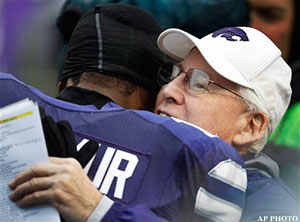
"Everyone has the same amount demanded of them," Weber says. "There's no greater importance on the offensive coordinator than there is on the maintenance man in the football facility. He holds them equally accountable. There's something unique about that. It's empowering, and it's a great lesson.
"The offense won't bark at the defense after a loss. If you lose a game 37-36, you could have the offensive staff at most programs say, 'Hey, we scored enough points to win.' You'll never hear that stance at Kansas State. Never, ever. No one points fingers. It's all about team. It creates a system where everyone works together."
Nobody demands to be heard. Everyone listens. There is no magic trick.
Snyder appears to keep it all out in the open. Ask anyone around the program if they've ever seen a side of Snyder that surprised them, or a moment when he wasn't himself. Ask them if they're sure there's no secret side to the man that gives it all away. The responses are similarly refrained.
"Hmmmm," Urick says. "I really can't think of anything."
The silence still says it all.
Max Thompson is the Senior Editor at ThePostGame. Follow him on Twitter.
Popular Stories On ThePostGame:
-- One-On-One With ESPN's Erin Andrews
-- The Official Unofficial Detroit Lions Cheerleaders Have Plenty Of Pride
-- America's Best Sports Bars
-- Tattoo Bet Leaves Lasting Imprint On Hockey Dad







